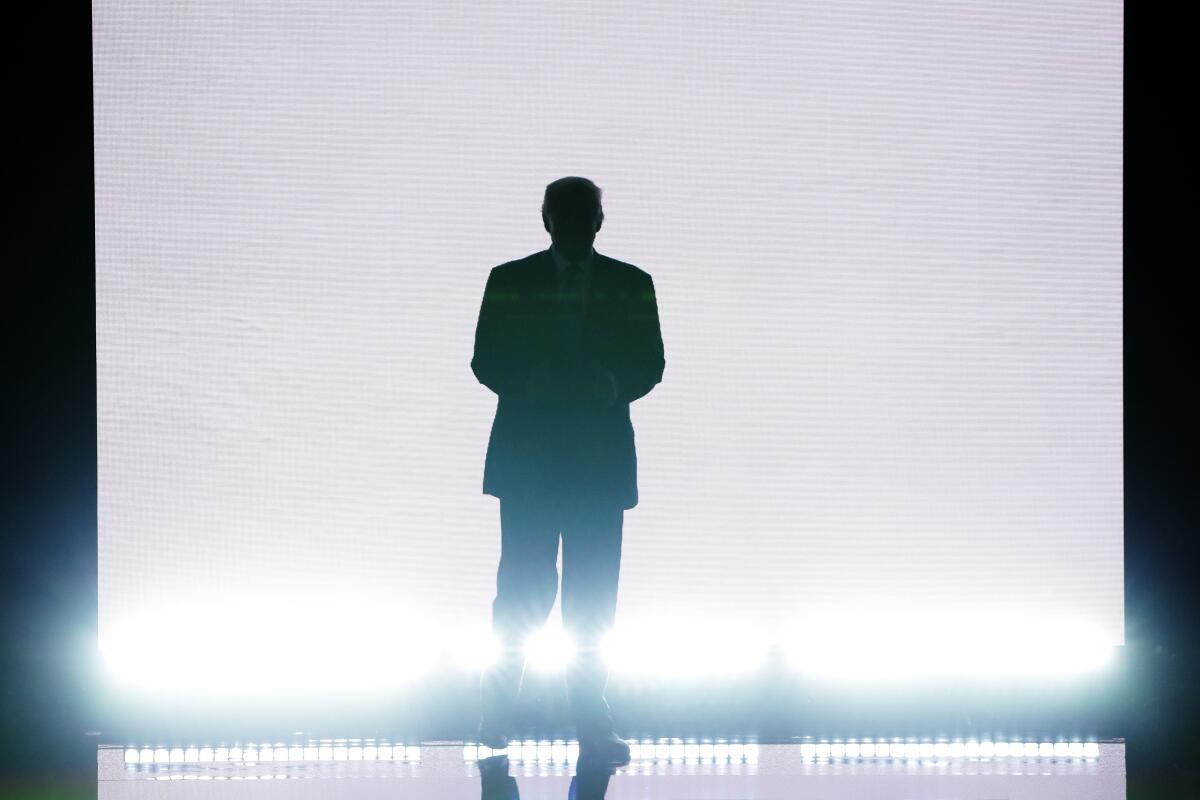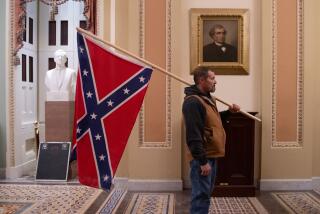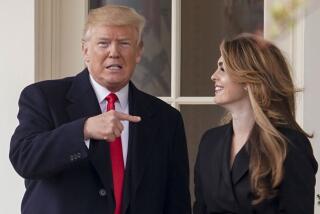Coronavirus overshadows Trump’s legacy in office

Four years ago, when Donald Trump accepted the Republican presidential nomination in a Cleveland basketball arena, he painted a dark portrait of a nation in crisis. “I alone can fix it,” he vowed.
In April this year, as a deadly contagion scythed the land and millions lost their jobs, Trump deflected all blame for his administration’s failure to control the coronavirus. “I don’t take responsibility at all,” he said.
As Trump prepares to accept his party’s nomination again on Thursday, this time from the splendor of the White House, his legacy after one term is the vast political chasm between his grandiose promises and slipshod delivery.
He has kept some of his 2016 campaign pledges, cracking down on immigration and nullifying dozens of Obama-era regulations and diplomatic achievements. But Trump’s successes are deep in the penumbra of a devastating pandemic, economic calamity and painful racial reckoning, all on his watch.
Even the promises he has fulfilled have come with caveats.
Rather than building a wall along the `1,954-mile-long border with Mexico, as he vowed, he has built or refurbished roughly 200 miles — and Mexico didn’t pay a penny. He enacted the largest overhaul of the tax code in three decades and a criminal justice reform bill, just as he said, but failed to overturn the Affordable Care Act or offer a plan to repair roads, bridges and other infrastructure.
He put two conservatives on the Supreme Court, but judges have blocked several of his executive orders on immigration and the environment. He has pulled the United States from arms control, climate and other international accords, opening up a deep rift with U.S. allies. He revamped a trade agreement with Mexico and Canada, but has failed to achieve the sweeping deal with China he claimed would be easy.
For historians, Trump’s policy wins and losses may figure less in his legacy than his caustic personal impact on the institution of the presidency. He has purged government agencies of critics, gutted federal oversight and expertise, and pushed the limits of executive power to protect himself and his inner circle.
Trump will go down in history as only the third president to be impeached in office — and the first to then run for reelection. Just months after he was acquitted in the Senate, the constitutional crisis of last fall already seems like just another fading plot line from a presidency constantly embroiled in controversy, melodrama and scandal.
The November election is a referendum, in large part, on Trump’s performance in office. The outcome will help determine his place in the history books.
“If he gets reelected, he’s changed the presidency forever,” said Douglas Brinkley, a professor of history at Rice University. “Right now, he’s a cult figure. You can say he’s ranked at the bottom of American presidents alongside James Buchanan, but there is no cult around James Buchanan. Trump will be around in history for a long time because his supporters will think he’s as great as Lincoln.”
His greatest challenge in office has been managing the coronavirus outbreak, the kind of unforeseen cataclysm that only a handful of presidents ever face. But by almost any measure, he has failed to harness the nation’s resources and grit to prevent needless deaths and confusion. Polls show Americans overwhelmingly disapprove of his response.
For weeks, Trump downplayed the threat or insisted it was under complete control. When the emergency worsened, he claimed he had near-total authority to act, and then abruptly insisted that governors must take charge. As hospitals have sought critical supplies, and the death toll has soared to the worst by far in the world, he has touted unproven drugs and dangerous therapies.
“The American people yearn for national leadership in crises, for a president who recognizes such moments as a time for unity,” said Timothy Naftali, a presidential historian at New York University, who compared the challenge of fighting the pandemic to the Japanese attack on Pearl Harbor that brought America into World War II, and the 9/11 attacks that launched a global war on terrorists.
“Instead of promoting national resolve, Trump began to confuse people about the nature of the challenge and for that he will always be remembered because it inevitably led to unnecessary deaths,” Naftali said.”He created a false sense of security in a crisis, and Americans don’t forgive lies from their government.”
Trump has also frayed the social fabric like no other modern president. Tweeting at all hours, he has unleashed more than 20,000 false or misleading claims since taking office, flouting ethical norms and fanning the flames of sexism, nativism and racism.
He defended neo-Nazis in Charlottesville, Va., as “very fine people,” denigrated African nations as “shithole countries,” said American cities led by Democrats should “rot,” disparaged journalists and belittled immigrants as criminals and worse.
His supporters have praised his “authenticity.” His detractors denounced him as a demagogue.
“The underbelly of American politics has always been how to mobilize white grievance and resentment,” said Eddie S. Glaude, a professor of African American studies at Princeton University. “We cannot read Trump as an exception. He is an extension of what has always been.”
Six months ago, Trump planned to seek reelection on a record of economic growth, no foreign wars and domestic accomplishments mostly aligned with Republican orthodoxy: tax cuts and deregulation, criminal justice reform and appointing more than 200 conservative judges to the federal bench.
“In the areas where he followed a traditional conservative or Republican policy, he was wildly successful,” said Michael Steel, former top aide to GOP House Speaker John A. Boehner.
Tommy Binion, a vice president at the Heritage Foundation, a conservative think tank in Washington, called Trump’s appointment of Justices Neil M. Gorsuch and Brett M. Kavanaugh to the Supreme Court “the biggest thing he did.”
But Trump’s chaotic approach to governing has been evident from his first week, when he signed an executive order banning migrants or visitors from seven predominantly Muslim countries. It fulfilled a campaign promise but spawned tumult at airports and widespread protests.
Courts swiftly struck the Muslim ban down, foreshadowing a shoot-first, aim-later policy-making process that hampered the administration’s effectiveness for most of Trump’s tenure. After a second effort was also nullified, Trump’s third, more limited order was narrowly upheld by the Supreme Court in June 2018.
Determined to unwind Obama administration initiatives, Trump has rolled back dozens of environmental regulations on energy and resource extraction, safety rules that he claimed were onerous to businesses and fuel economy standards for new automobiles. Many others have been blocked in court.
Trump has arguably had his greatest success in advancing his controversial agenda to restrict immigration.
While he failed to build much of his border wall, he imposed harsh new restrictions on legal immigration, including for those seeking asylum, and his administration declared “zero tolerance” for illegal entries in 2018.
But when thousands of children were separated from their parents in makeshift detention centers on the border, the political backlash at the “kids in cages” was so intense that Trump suspended the practice.
Border apprehensions have plummeted in recent months, although that may be due to fewer jobs being available during the pandemic and a normal slowdown during the summer’s baking heat.
Mark Krikorian, a staunch restrictionist who heads the Center for Immigration Studies in Washington, credits Trump for doing more than any other president to reduce the influx of undocumented immigrants, but also harbors some disappointments, including a failure to strengthen protections for U.S. workers.
“Almost all of the changes they’ve made, a subsequent administration can get rid of them because they’re not set in legislation,” Krikorian said.
Despite his repeated threats, Trump never cut federal funding for so-called sanctuary cities, and his effort to repeal President Obama’s Deferred Action for Childhood Arrivals order, one of his 2016 campaign promises, was blocked by the Supreme Court.
Republicans lost control of the House in the 2018 elections, limiting Trump’s ability to pass legislation. Polls have showed widespread opposition to his efforts to gut Obamacare and growing disenchantment with the growing signs of bedlam in the White House.
Trump has kept his word on pursuing what he called an “America first” foreign policy, an isolationist approach that saw America pull back sharply from global engagement and leadership.
He withdrew the U.S. from the 2015 deal to curb Iran’s nuclear program, the Paris Agreement on climate change, the Open Skies global surveillance treaty, the Intermediate-range Nuclear Forces Treaty with Russia, and other international agreements. He even cut U.S. funding to the World Health Organization during the pandemic.
But Trump’s most ambitious efforts overseas — achieving a Mideast peace deal and nuclear disarmament in North Korea — have come to naught.
His self-described “love letters” and three face-to-face meetings with Kim Jong Un failed to persuade the North Korean leader to give up his nuclear weapons, or even stop producing more.
In 2018, Trump kept a promise to move the U.S. Embassy in Israel from Tel Aviv to Jerusalem, which he also recognized as Israel’s capital — a slap to Palestinians, who also consider it their capital.
But his efforts to secure a regional peace deal have gone nowhere aside from one breakthrough: Two weeks ago, the United Arab Emirates became only the third Arab country to normalize relations with Israel. Other Arab states could follow.
He has stunned U.S. allies by threatening to pull out of the NATO military alliance and by cozying up to Russian President Vladimir Putin, whom Europe views as a direct threat. He has expressed disdain for America’s traditional allies, upending summits with bluster, threats and insults.
“The level of trust between the U.S. and Europe is at the lowest level in decades, and that’s solely because of Trump and his administration,” said Rachel Rizzo, an expert on Europe at the Truman Center, a Washington think tank.
“To a subset of Americans, he has cast doubt on Europe and our membership in NATO. That’s extremely damaging and will last for a long time,” Rizzo said.
Intent on avoiding military conflict and cutting back U.S. troops overseas, Trump’s use of force was sporadic and unpredictable — including a missile strike in Iraq that targeted and killed a senior Iranian official, Maj. Gen. Qassem Suleimani, in January.
Trump’s “maximum pressure” campaign against Tehran, including pulling out of the nuclear deal and imposing stiff new sanctions, has failed to push Iran back to the negotiating table, as Trump had hoped. But it also hasn’t started a wider conflict, as many had feared.
Trump’s scattershot isolationism dovetailed with his protectionist stance on trade, another key part of his legacy.
Seeking to pressure Beijing to the bargaining table, Trump in early 2018 imposed tariffs on $550 billion in steel and aluminum from China, claiming that “trade wars are good and easy to win.”
If anything, the opposite has proven true.
China slapped tariffs on $185 billion in U.S. products, and negotiations quickly stalled. After months of rising tensions, the two countries agreed in January to a “phase one” deal that rolled back tariffs but did not deal with the problems that Trump had vowed to solve: intellectual property protections for U.S. business interests in China, technology transfers, and currency practices.
With Chinese markets closed to key U.S. exports, American farmers, a key segment of Trump’s political base, bore the brunt of the trade war. Trump was forced to offset their losses with taxpayer-funded bailouts — $11.5 billion in 2018, an additional $16 billion in 2019 and a staggering $32 billion this year.
If anything has animated Trump’s supporters as much as his tough talk on immigration and trade, it may have been his promise to take a wrecking ball to the nation’s capital and its political establishment. In that area, it’s fair to say the president has followed through.
He has governed much the way he ran his family business conglomerate from Trump Tower in New York, demanding loyalty and public praise from underlings, lashing out at slights and criticism, and treating domestic and foreign policy as a matter of political patronage.
“We normally judge presidents by the bills they pass and the wars they fight,” said David Gergen, a counselor to four presidents. “In this case, there’s an additional element of how Trump is undermining the presidency itself and leaving an institution that’s more distrusted than when he came in, and that makes it that much more difficult to govern.”
Early in his term, Trump pressured FBI Director James B. Comey to end an investigation into his first national security advisor, Michael Flynn, and then fired Comey when he refused.
That led to a special counsel investigation, led by former FBI Director Robert S. Mueller III, that ultimately charged or indicted more than 30 individuals, including Flynn, Paul Manafort, who was Trump’s former campaign manager, and Michael Cohen, Trump’s former lawyer.
Unlike President Clinton during the Whitewater investigation, Trump refused to sit for an interview and relentlessly denounced the probe as a “hoax” and a “political witch hunt.”
During last year’s House impeachment proceedings over his attempts to pressure Ukraine to investigate Joe Biden, now the Democratic nominee for president, Trump refused to comply with congressional subpoenas — unlike President Nixon during Watergate.
And while Republicans ultimately turned on Nixon and forced him from office, nearly every Republican backed Trump or was silent as the scandals mounted.
“The defining legacy of Trump is his demonstration that a person completely lacking in a commitment to liberal constitutional democracy can be elected president and that, as an ‘elected authoritarian,’ he or she can wield great power and do tremendous damage to the nation’s institutions and norms,” said Kevin C. O’Leary, a fellow at the Center for the Study of Democracy at UC Irvine. “While the press, the courts, and portions of the national security apparatus fought back, the GOP embraced Trump and his authoritarian ways.”
The latest case came this month when Trump vowed to block emergency funding for the U.S. Postal Service, explaining that Democrats were more likely to use mail-in ballots in November. Republicans were largely silent when he acknowledged trying to stop Americans from voting, the foundation of democracy.
“Trump’s single greatest bit of political savvy was terrifying Republican members of Congress that he would destroy them if they broke ranks,” said Brinkley, the Rice University history professor who views Trump’s political persona as a successor to bygone American demagogues Joseph McCarthy and George Wallace.
But the 45th president, Brinkley said, will likely be immortalized in American history above all for his unabashed assertion of power in the service of self-interest and the way he has tested the durability of the Constitution itself.
“Trump wants to blow up the checks and balances. He has utter contempt for Congress and really for democracy,” Brinkley said. “That type of politician has been ubiquitous in world history. But it’s been confusing to us as a country because it’s never before taken root in the American land.”
More to Read
Get the L.A. Times Politics newsletter
Deeply reported insights into legislation, politics and policy from Sacramento, Washington and beyond. In your inbox three times per week.
You may occasionally receive promotional content from the Los Angeles Times.







